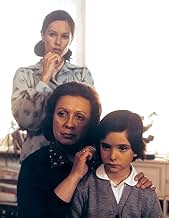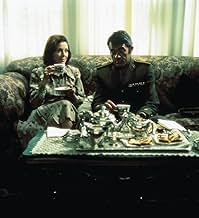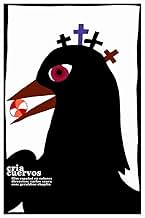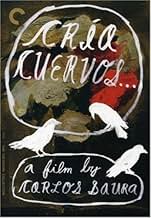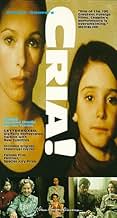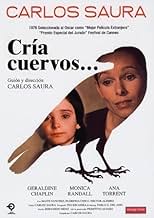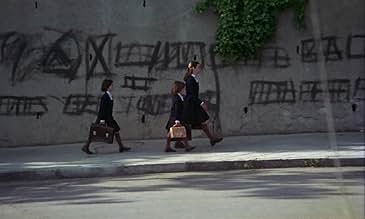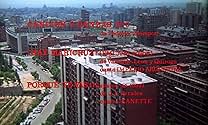AVALIAÇÃO DA IMDb
7,9/10
12 mil
SUA AVALIAÇÃO
No crepúsculo da ditadura de Francisco Franco, uma órfã de oito anos e suas duas irmãs encontram refúgio na casa de sua tia, fazendo todo o possível para se acostumar a uma nova realidade.No crepúsculo da ditadura de Francisco Franco, uma órfã de oito anos e suas duas irmãs encontram refúgio na casa de sua tia, fazendo todo o possível para se acostumar a uma nova realidade.No crepúsculo da ditadura de Francisco Franco, uma órfã de oito anos e suas duas irmãs encontram refúgio na casa de sua tia, fazendo todo o possível para se acostumar a uma nova realidade.
- Prêmios
- 8 vitórias e 4 indicações no total
Conchita Pérez
- Irene
- (as Conchi Perez)
Mayte Sanchez
- Maite
- (as Maite Sánchez)
Mónica Randall
- Paulina
- (as Monica Randall)
Josefina Díaz
- Abuela
- (as Josefina Diaz)
Germán Cobos
- Nicolás Garontes
- (as German Cobos)
Héctor Alterio
- Anselmo
- (as Hector Alterio)
Julieta Serrano
- Ana
- (narração)
Avaliações em destaque
10zetes
A perfect sister film to one of my absolute favorites, Spirit of the Beehive. It also stars Ana Torrent and has similar themes. And I like it probably as much. Torrent, three years older but looking pretty much the same, plays the middle child of three girls. At the beginning of the film, their father has just died. Their mother (played by Geraldine Chaplin) died a while back. The film is told through the mind of Ana, who is still mourning her mother, and she often sees her. It can be confusing at the beginning. Chaplin also appears as the adult Ana, who narrates some of her thoughts, or possibly as what Ana believes she will become. This is very ambiguous. The girls' aunt Paulina is now taking care of them. The duty was kind of forced upon her and, while she's trying her hardest, it's taking its toll. She's stern and not well liked by the girls, especially Ana. There isn't much plot, per se, and what little there is shouldn't be ruined. We often see Ana's imagination and memories come to life. We see her witness fights between her parents. Later on, she reenacts them with her sisters. The film is about what children observe, how they interpret it and how they act on those interpretations. The film also has political ramifications, subtle ones that are pretty difficult to grasp. The title is the beginning of a Spanish proverb that goes: "Raise ravens, and they'll tear out your eyes." Like Spirit of the Beehive, the film depicts a child experimenting with her own cruelty and violence. Supposedly this is all a criticism of the Fascist government (Franco had just died by this point, so his regime was just on its way out). It's a very dense and fascinating movie. You'd probably still be swimming through its mysteries on a hundredth viewing. If you thought possibly that Ana Torrent was not acting in Spirit of the Beehive, this will set you straight. Her blank, soulful expression is here in full force, of course, but here you see the slightest smile creep across her face, and you can just tell exactly what she's thinking. I'm afraid I've done an awful job reviewing Cría Cuervos. I haven't expressed how touching it is when dealing with Ana's loneliness (there's a scene where she dreams that her mother pops into her bedroom to tell her a story that's just heartbreaking), or how it often straddles dark comedy, like the scenes between Ana and the maid. I think that difficulty in reviewing it shows just how layered and confounding the film is. It shoots right up my favorites list. It's easily the best film I've seen all year. Bravo to Criterion for bringing this one to DVD. Hope they also get to Saura's La Caza sometime in the future.
As yet unavailable on DVD in the UK, this brilliant Spanish classic is now back on the big screen in a beautifully restored print. Thirty five years after it was made, Cria Cuervos is (by and large) just as potent and relevant as it was when first released.
There is a scene, quite early on in the film, where a young girl called Ana, and her two sisters, walk into their aunt's bedroom and start playing with her makeup and wardrobe, rouging their cheeks and applying lipstick in copious amounts. I think, at that point, almost everyone in the screening, tried to hide a sardonic smile.
However, it is not for its ironies when seen in the present day that we remember this film most. We remember it because it offers us something we very rarely see in cinema: an honest, sincere evocation of childhood and the gradual, warped loss of innocence. That is the premise of dozens of films, I realise, but seldom is anything like this achieved; movies of this type are either cloying and sentimental, or else sensationalised and melodramatic. Neither obtains the poignant sense of disquiet that 'Cria Cuervos' generates.
The film begins with Ana losing her father. Her mother, we quickly learn, died a few years ago, and Ana is left an orphan. She and her two sisters are sent to live with their aunt – a fundamentally kind, but authoritarian guardian who Ana, yearning for her own mother, instinctively rebels against. We follow Ana's story from the time of her father's death to the end of the summer holidays, after which she will start school with her sisters.
This, I hasten to add, is a very simplified, desiccated overview of the plot. It is a film packed with nuance and subtlety. We learn that Ana's father was in fact a soldier under Franco's regime, and had at one time fought alongside the Nazis. In one of the most memorable scenes in the film, Ana finds her father's gun, still loaded, leading to a tense scene with her aunt and her aunt's lover.
Ana is a fascinating child. The eagle eyed film buff might remember the actress who plays her from 'The Spirit of the Beehive', another Spanish classic which deals with similar themes, albeit in a different way. Most striking are those large, brown eyes of hers; Ana is a quiet, observant child, disturbed by her brief glimpses into the adult world, gradually accumulating as she grows older. How much does she understand? Obviously, when Ana grows into an adult and narrates the story through flashback, hindsight will let her comprehend the things she has seen. But what of when she is younger? The answer is largely subjective. The film draws many comparisons between Ana's grandmother and the young Ana herself – the old woman is paralysed, in a wheelchair. She is capable of hearing and seeing – and understanding the things other people say. But she never says anything. Whether this is part of her affliction, or a conscious choice, is left deliberately ambiguous. What we can see is that Ana sympathises with her grandmother, and a gentle, compassionate relationship evolves between the two.
I could go on. Perhaps the most impressive thing about the film is the way it seamlessly blends fact, fiction and memory so beautifully and precisely, without ever losing sight of its ultimate goal; indeed, this very blending lends the film an incredible authenticity. Ana feels isolated and alone – her fantasies, from the shocking to the seemingly banal, are desperate and painful. The opening montage, as well, of a collection of family photographs, is extremely subtle and masterful in the way it has us beginning to formulate questions and suspicions – some of which are assuaged, some of which aren't.
What a treat this is for any film fan! Carlos Saura (the director), was of course one of the great opponents of the Franco regime, while also rated as one of the most important Spanish directors of the 1970s. This is probably his most well known and powerful film. Childhood can be a frightening, confusing, and sad time, and Saura, with what is arguably his masterpiece, has captured that beautifully. Don't miss!
There is a scene, quite early on in the film, where a young girl called Ana, and her two sisters, walk into their aunt's bedroom and start playing with her makeup and wardrobe, rouging their cheeks and applying lipstick in copious amounts. I think, at that point, almost everyone in the screening, tried to hide a sardonic smile.
However, it is not for its ironies when seen in the present day that we remember this film most. We remember it because it offers us something we very rarely see in cinema: an honest, sincere evocation of childhood and the gradual, warped loss of innocence. That is the premise of dozens of films, I realise, but seldom is anything like this achieved; movies of this type are either cloying and sentimental, or else sensationalised and melodramatic. Neither obtains the poignant sense of disquiet that 'Cria Cuervos' generates.
The film begins with Ana losing her father. Her mother, we quickly learn, died a few years ago, and Ana is left an orphan. She and her two sisters are sent to live with their aunt – a fundamentally kind, but authoritarian guardian who Ana, yearning for her own mother, instinctively rebels against. We follow Ana's story from the time of her father's death to the end of the summer holidays, after which she will start school with her sisters.
This, I hasten to add, is a very simplified, desiccated overview of the plot. It is a film packed with nuance and subtlety. We learn that Ana's father was in fact a soldier under Franco's regime, and had at one time fought alongside the Nazis. In one of the most memorable scenes in the film, Ana finds her father's gun, still loaded, leading to a tense scene with her aunt and her aunt's lover.
Ana is a fascinating child. The eagle eyed film buff might remember the actress who plays her from 'The Spirit of the Beehive', another Spanish classic which deals with similar themes, albeit in a different way. Most striking are those large, brown eyes of hers; Ana is a quiet, observant child, disturbed by her brief glimpses into the adult world, gradually accumulating as she grows older. How much does she understand? Obviously, when Ana grows into an adult and narrates the story through flashback, hindsight will let her comprehend the things she has seen. But what of when she is younger? The answer is largely subjective. The film draws many comparisons between Ana's grandmother and the young Ana herself – the old woman is paralysed, in a wheelchair. She is capable of hearing and seeing – and understanding the things other people say. But she never says anything. Whether this is part of her affliction, or a conscious choice, is left deliberately ambiguous. What we can see is that Ana sympathises with her grandmother, and a gentle, compassionate relationship evolves between the two.
I could go on. Perhaps the most impressive thing about the film is the way it seamlessly blends fact, fiction and memory so beautifully and precisely, without ever losing sight of its ultimate goal; indeed, this very blending lends the film an incredible authenticity. Ana feels isolated and alone – her fantasies, from the shocking to the seemingly banal, are desperate and painful. The opening montage, as well, of a collection of family photographs, is extremely subtle and masterful in the way it has us beginning to formulate questions and suspicions – some of which are assuaged, some of which aren't.
What a treat this is for any film fan! Carlos Saura (the director), was of course one of the great opponents of the Franco regime, while also rated as one of the most important Spanish directors of the 1970s. This is probably his most well known and powerful film. Childhood can be a frightening, confusing, and sad time, and Saura, with what is arguably his masterpiece, has captured that beautifully. Don't miss!
In Madrid, the orphan sisters Irene (Conchota Pérez), Ana (Ana Torrent) and Maite (Maite Sánchez) are raised by their austere aunt Paulina (Mônica Randall) together with their mute and crippled grandmother after the death of their mother (Geraldine Chaplin) and their military father Anselmo (Héctor Alterio). Ana is a melancholic girl, fascinated by death, after seeing her mother having a painful death and her father dead in bed.
"Cria Cuervos" is a beautiful and sad movie of Carlos Saura that can be watched in two levels: in the first plane, it is a film that recalls the style of the family dramas of Ingmar Bergman. However, in a deeper level, the story is actually a metaphor of the recent Spanish political history, and each character represents a segment of their society: Ana's father represents the military dictatorship of Franco; her dying mother, the republic; her grandmother, those who miss the republic; Ana is probably the youth with a sad childhood surrounded by deaths. The conclusion is a message of hope for the people. I believe that those familiarized with the Spanish history would find many other elements, but in both levels this movie is wonderful. The title is a reference to the Spanish proverb "Cría cuervos y te sacaran los ojos" which means "Raise the ravens, and they will remove your eyes". Ana Torrent shows her amazing talent in the beginning of her successful career. My vote is eight.
Title (Brazil): "Cría Cuervos " ("Raise Ravens ")
"Cria Cuervos" is a beautiful and sad movie of Carlos Saura that can be watched in two levels: in the first plane, it is a film that recalls the style of the family dramas of Ingmar Bergman. However, in a deeper level, the story is actually a metaphor of the recent Spanish political history, and each character represents a segment of their society: Ana's father represents the military dictatorship of Franco; her dying mother, the republic; her grandmother, those who miss the republic; Ana is probably the youth with a sad childhood surrounded by deaths. The conclusion is a message of hope for the people. I believe that those familiarized with the Spanish history would find many other elements, but in both levels this movie is wonderful. The title is a reference to the Spanish proverb "Cría cuervos y te sacaran los ojos" which means "Raise the ravens, and they will remove your eyes". Ana Torrent shows her amazing talent in the beginning of her successful career. My vote is eight.
Title (Brazil): "Cría Cuervos " ("Raise Ravens ")
This film is such a splendid experience that it's difficult to really describe objectively why. The plot, the characters are revealed at a perfect tempo, keeping the audience engrossed and anticipating what's next. Any film with such sparse dialogue needs to make the rare lines worthwhile, and Saura certainly does, probably learning from Erice, the master of indispensable dialogue. Ana Torrent invites all sorts of Erice comparisons, but I see Saura taking a step beyond him here visually.
"Beehive" was a landmark film, and unlike anything that had been made. But the camera maintained the same distance and the story was fundamentally allegorical. Saura experiments with distance, sometimes following the characters closely, sometimes giving an omniscient birds eye view of the area. Sometimes remaining a mere witness to what's happening. It's very carefully calculated to best enhance the scene and keep these extraordinary events within the realm of possibility.
If there's such a film as a director's film, this is it. Although it is certainly worthwhile for the performances as well.
5 out of 5 - Essential
"Beehive" was a landmark film, and unlike anything that had been made. But the camera maintained the same distance and the story was fundamentally allegorical. Saura experiments with distance, sometimes following the characters closely, sometimes giving an omniscient birds eye view of the area. Sometimes remaining a mere witness to what's happening. It's very carefully calculated to best enhance the scene and keep these extraordinary events within the realm of possibility.
If there's such a film as a director's film, this is it. Although it is certainly worthwhile for the performances as well.
5 out of 5 - Essential
I have seen several thousand films in my life and this one became the top one almost instantly. Ever since I have watched it several times and it has never failed to impress and delight me - it even increases the sense of mystery undelying in its baroque and compelling history. On my opinion, it is Carlos Saura's masterpiece and perhaps the best film ever made about the mysterious inner world children live in and create. There is so much to be enjoyed in this film, that a conventional review will not make it justice.
Você sabia?
- CuriosidadesThe title in Spanish stems from the phrase "Raise ravens and they'll pluck out your eyes." The equivalent phrase in English would be "you reap what you sow."
- Cenas durante ou pós-créditosThe closing credits identify Cancion y Danzas Number 5 of Frederic Mompou. But it was definitely Number 6 that we heard.
- ConexõesFeatured in Zomergasten: Episode #4.1 (1991)
- Trilhas sonorasCanción y Danzas N.6
Composed by Frederic Mompou (as Federico Mompou)
Principais escolhas
Faça login para avaliar e ver a lista de recomendações personalizadas
- How long is Cría Cuervos?Fornecido pela Alexa
Detalhes
- Data de lançamento
- País de origem
- Central de atendimento oficial
- Idioma
- Também conhecido como
- Cría Cuervos
- Locações de filme
- 15 Calle de María de Molina, Madri, Espanha(family house)
- Empresas de produção
- Consulte mais créditos da empresa na IMDbPro
Bilheteria
- Faturamento bruto mundial
- US$ 14.548
- Tempo de duração
- 1 h 45 min(105 min)
- Mixagem de som
- Proporção
- 1.66 : 1
Contribua para esta página
Sugerir uma alteração ou adicionar conteúdo ausente

